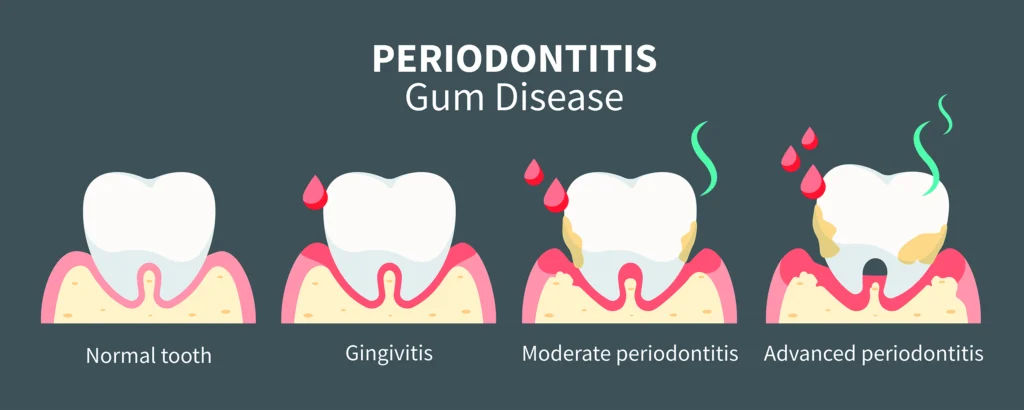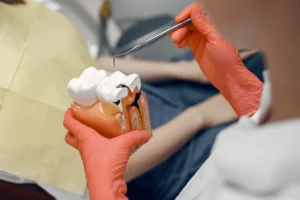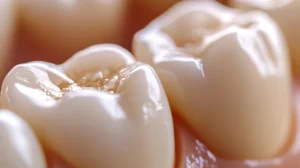Table of Contents
Maintaining healthy gums is crucial not only for your oral health but also for your overall well-being. Gum disease, also known as periodontal disease, is a common yet serious condition that affects millions of people worldwide. It can lead to a wide range of health complications if left untreated. In this article, we’ll dive into the details of gum disease—what it is, how it develops, its impact on your health, and the available treatment options.
What Is Gum Disease?
Gum disease is an infection of the tissues that surround and support your teeth. It begins with the inflammation of the gums (gingivitis) and can progress to a more severe form called periodontitis if not treated. In its early stages, this disease can be painless, which is why many people may not realize they have it until it has advanced.
Gum disease starts when bacteria in plaque, a sticky film that forms on your teeth, accumulate and cause inflammation in the gums. The immune system responds to this buildup by trying to fight the bacteria, leading to inflammation and swelling. If the bacteria are not properly removed through regular brushing and flossing, they continue to grow and spread, causing further damage to the gums and eventually to the bone that supports your teeth.

How Does Gum Disease Develop?
Gum disease progresses in stages, beginning with gingivitis and potentially advancing to periodontitis. Understanding the development can help you take preventive measures before it escalates into a more serious problem.
Gingivitis
The earliest stage of gum disease, gingivitis, is characterized by gum inflammation. Symptoms include redness, swelling, and bleeding when brushing or flossing. At this stage, the damage is reversible since the infection has not yet affected the bones or connective tissues that support the teeth.
Periodontitis
If gingivitis is left untreated, it can develop into periodontitis, where the inflammation spreads below the gum line and affects the bone and tissues supporting the teeth. As the disease progresses, pockets form between the teeth and gums, which become infected. The immune system continues to fight the bacteria, but this response can break down the bone and tissue, causing them to weaken over time.
Advanced Periodontitis
In the advanced stages of periodontitis, the gums, bone, and connective tissues that hold the teeth in place are destroyed. This can lead to loose teeth, tooth loss, and even the spread of infection to other parts of the body.
Can Gum Disease Be Reversed?
The answer depends on the stage of the disease.
- Gingivitis can be completely reversed with proper oral care, including brushing, flossing, and regular dental cleanings. Since this is the earliest stage, the inflammation and damage to the gums are minimal and can be corrected before it leads to more serious problems.
- Periodontitis, on the other hand, cannot be fully reversed, but it can be managed and controlled with professional treatment. Once the disease reaches this stage, the damage to the bone and tissues is often permanent, but further progression can be stopped through various treatments.
The earlier you seek treatment, the better the chances of reversing or controlling the disease. Regular dental visits are essential for early detection and treatment.
How Gum Disease Affects Overall Health
Gum disease doesn’t just impact your oral health—it can have far-reaching effects on your overall health as well. Research has shown a strong link between this disease and several chronic conditions, including:
1. Heart Disease
One of the most significant connections between gum disease and overall health is its link to heart disease. Inflammation caused by gum disease can contribute to the buildup of plaque in the arteries, increasing the risk of heart attack and stroke. Studies have found that people with gum disease are more likely to develop cardiovascular problems than those with healthy gums.
2. Diabetes
People with diabetes are at a higher risk, and can, in turn, make it more difficult to control blood sugar levels. The inflammation associated with gum disease can cause insulin resistance, making it harder to regulate glucose levels and increasing the risk of diabetic complications.
3. Respiratory Diseases
Bacteria from the mouth can be inhaled into the lungs, leading to respiratory infections such as pneumonia. People with this disease are more susceptible to these infections, particularly those with weakened immune systems.
4. Pregnancy Complications
Pregnant women with gum disease are at an increased risk of developing pregnancy complications, such as premature birth or low birth weight. Inflammation and infection in the gums can trigger the production of chemicals that induce labor early, posing risks to both the mother and baby.
What Do I Do If I Have Gum Disease?
If you suspect you have gum disease, it’s important to take action right away. Here are steps you should take:
Schedule a Dental Appointment
If you notice any signs, such as red, swollen, or bleeding gums, don’t delay scheduling an appointment with our dentist. Early detection is key to preventing the progression of gum disease.
Improve Your Oral Hygiene Routine
Brushing your teeth twice a day, flossing daily, and using an antibacterial mouthwash can help keep plaque at bay. Consider using an electric toothbrush for a more thorough clean.
Quit Smoking
Smoking is a major risk factor. It weakens your immune system, making it harder to fight off the bacteria that cause gum disease. Quitting smoking can improve your gum health and reduce your risk of developing the disease.
Follow Your Dentist’s Treatment Plan
Depending on the severity, our dentist may recommend different treatments, such as:
- Deep Cleaning (Scaling and Root Planing): This procedure involves removing plaque and tartar from above and below the gum line, as well as smoothing the roots of the teeth to help the gums reattach.
- Medications: Our dentist may prescribe antibiotics or antimicrobial mouthwashes to help control the infection and reduce inflammation.
- Surgical Treatments: In advanced cases, surgical procedures like flap surgery or bone grafting may be necessary to restore damaged tissue and bone.
Maintain Regular Dental Checkups
Even if it is under control, regular dental visits are essential for monitoring your condition and preventing future problems.
How Is Gum Disease Treated?
Gum disease treatment varies depending on the stage and severity of the condition. Here’s a look at the common treatment options:
Professional Cleaning
For mild cases of gingivitis, a professional dental cleaning may be sufficient to remove plaque and tartar from the teeth and gums. Regular cleanings, usually every six months, are essential for prevention.
Scaling and Root Planing
For more advanced gum disease, our dentist may recommend scaling and root planing, a deep cleaning procedure that removes plaque and tartar from below the gum line and smooths the roots of the teeth to help the gums reattach.
Antibiotics
In some cases, antibiotics may be prescribed to help eliminate the bacteria causing the infection. These can be taken orally or applied directly to the gums.
Surgery
In severe cases of periodontitis, surgery may be required to restore the health of the gums and supporting tissues. Surgical options include flap surgery to remove bacteria and reduce the size of gum pockets, and bone or tissue grafts to regenerate lost bone and gum tissue.
Conclusion
Gum disease is a serious condition that not only affects your oral health but also has a significant impact on your overall well-being. The good news is that with proper care and timely treatment, gum disease can be managed, and in its early stages, even reversed. If you’re concerned about your gum health, don’t wait—schedule a dental checkup with Rim Point Dental to get the care you need. By addressing gum disease early, you can protect your smile and reduce your risk of developing other health complications.



